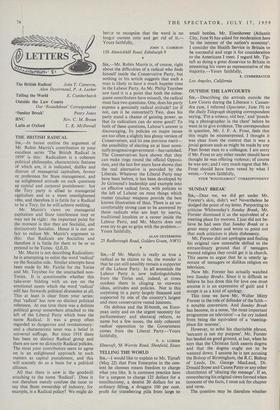The British Radical John T. Cameron,
Alan Deyermond, P. A. Lusher
Telling the World E. Cumberbatch
Outside the Law Courts Our 'Roundabout' Correspondent
'Sunday Break' Penry Jones BNC Rev. C. M. Broun Latin at Oxford C. K. McDowall
THE BRITISH RADICAL
SIR,—In barest outline the argument of Mr. Robin Marris's contribution to your excellent series 'The British Radical in 1959' is this: Radicalism is a coherent political philosophy, characteristic features
of which are, it is indicated, dislike and distrust of managerial capitalism, favour or preference for State management, and an enlightened attitude on such questions as capital and corporal punishment: but the Tory party is allied to managerial critalism and to a more unenlightened vete, and therefore it is futile for a Radical to be a Tory, for he will achieve nothing.
Mr. Marris's views on managerial capitalism and State interference may or may not be right: the important point for the moment is that they are Socialist, and distinctively Socialist. Hence it is not un- fair to reduce Mr. Marris's argument to this: that Radicals are Socialists and therefore it is futile for them to be or to pretend to be Tories. Q.E.D.
Mr. Marris is not describing Radicalism: he is attempting to enlist the word 'radical' on the Socialist side. Similar attempts have been made by Mr. Fairlie for the Tories and Mr. Toynbee for the unattached non- Tories. It is questionable whether this take-over bidding with an eye on the emotional assets which the word 'radical' still has forwards political discussion at all. This at least is clear from your series: that 'radical' has now no distinct political reference. At one time there was a definite political group somewhere attached to the left of the Liberal Party which bore the name Radical. It was a group often regarded as dangerous and revolutionary: and a characteristic tenet was a belief in universal suffrage. But since 1918 there has been no distinct Radical group and there are now no distinctly Radical policies. The most your contributors seem to agree on is an enlightened approach to such matters as capital punishment, and this will scarcely do as a basis for a political alliance.
All that there is now is the goodwill attaching to the name 'Radical'. Does it not therefore merely confuse the issue to say that State ownership of industry, for example, is a Radical policy? We might do bett2.r to recognise that the word is no longer current coin and get rid of it.— Yours faithfully, JOHN T. CAMERON
138 Alnwickhill Road, Edinburgh 9






































 Previous page
Previous page